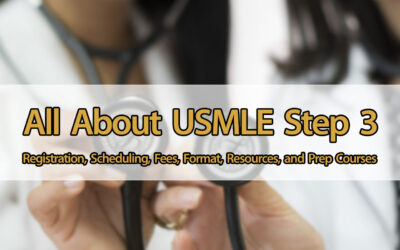The United States Medical Licensing Examination (USMLE) is a three-step examination process that medical students must complete to obtain a medical license in the United States. The first two steps, Step 1 and Step 2 are taken during medical school, while Step 3 is usually taken during the early years of residency. Many medical students and residents still determine the best time to take Step 3. In this comprehensive guide, we will discuss the ideal timing for Step 3, provide detailed information about the examination, and offer valuable tips for success. We aim to help you rank for the keyword “When do you take step 3” and ensure you have all the information you need to make an informed decision about your USMLE Step 3 exam.
Table of Contents
- Understanding the USMLE Step 3 Exam
- Importance of USMLE Step 3
- Factors to Consider When Choosing the Right Time to Take Step 3
- Ideal Timing for USMLE Step 3
- Registration and Eligibility for USMLE Step 3
- Best Months and Days of the Week for Taking Step 3
- Step 3 Exam Before or During Residency
- Study Schedule and Test Date
- Core Essentials for USMLE Step 3 Preparation
- Conclusion
- Frequently Asked Questions (FAQs)
Understanding the USMLE Step 3 Exam
USMLE Step 3 is the final step in the USMLE examination series and assesses a candidate’s ability to apply medical knowledge and clinical skills in an unsupervised setting. The exam consists of a multiple-choice section (Foundations of Independent Practice, or FIP) and a computer-based case simulation section (Advanced Clinical Medicine, or ACM). The FIP portion tests the candidate’s understanding of biomedical and clinical science principles, while the ACM section focuses on patient management, diagnosis, and treatment.
Importance of USMLE Step 3
Step 3 is a crucial component of the USMLE series and is vital in obtaining a medical license in the United States. At the same time, some might argue that Step 3 is less critical than Step 1 and Step 2 due to its focus on general medical knowledge and skills. The exam is an essential benchmark for assessing a candidate’s readiness for independent practice. Furthermore, a vital Step 3 score can enhance a candidate’s chances of securing a competitive fellowship or specialty position.
Factors to Consider When Choosing the Right Time to Take Step 3
There are several factors to consider when deciding when to take Step 3, including:
- Graduation Status: Candidates must have graduated from medical school before they can take Step 3. This means that the earliest a candidate can take the exam is after receiving their medical diploma and having it registered.
- Residency Schedule: Many residency programs have specific requirements regarding the timing of Step 3. It is essential to consult with your program director and consider the demands of your residency schedule when planning for Step 3.
- Study Time and Preparedness: Step 3 requires significant preparation, and candidates should ensure adequate time to study and feel confident in their clinical skills before taking the exam.
- Personal Factors: Personal factors, such as family commitments, financial considerations, and mental well-being, should also be taken into account when deciding on the timing of Step 3.
Ideal Timing for USMLE Step 3
The ideal timing for Step 3 varies from person to person, but there are some general guidelines to help you decide when to take the exam:
- During the First or Second Year of Residency: Most candidates take Step 3 during their first or second year. This timing allows for sufficient clinical experience while still having access to the knowledge gained during medical school.
- After Completing USMLE Step 2 CK and CS: It is recommended that candidates complete Step 2 CK (Clinical Knowledge) and CS (Clinical Skills) before attempting Step 3. This ensures that they have a solid clinical knowledge and skills foundation, which will be beneficial during Step 3 preparation and the exam itself.
- When You Feel Ready: Ultimately, the best time to take Step 3 is when you feel adequately prepared and confident in your ability to pass the exam. This may vary depending on your clinical experience, study habits, and personal factors.
Registration and Eligibility for USMLE Step 3
To register for USMLE Step 3, candidates must obtain eligibility through the Federation of State Medical Boards (FSMB) or an individual state medical board. The eligibility requirements vary by state but generally include completing medical school, passing Step 1 and Step 2, and meeting additional state-specific criteria. Once eligibility is granted, candidates can register for Step 3 through the FSMB website and select their preferred test dates.
Best Months and Days of the Week for Taking Step 3
There is no definitive answer for the best month or day of the week to take Step 3, as this largely depends on individual preferences and circumstances. However, some candidates may find it beneficial to schedule their exam during a less busy time in their residency program or when they have a lighter rotation. Additionally, taking the exam on a weekday may provide a quieter testing environment, as fewer candidates are likely to be at the testing center.
Step 3 Exam Before or During Residency
Taking Step 3 before starting residency has advantages, such as having more time to focus on studying and improving your chances of obtaining a competitive fellowship or specialty position. However, most candidates take Step 3 during their first or second year of residency, as this allows for sufficient clinical experience and exposure to real-world patient management scenarios.
Study Schedule and Test Date
Developing a study schedule for USMLE Step 3 is crucial for success. Candidates should allocate sufficient time to review core medical knowledge, practice clinical skills, and complete practice questions and simulations. The test date should be chosen based on the candidate’s level of preparedness and personal factors, such as residency commitments and family obligations.
Core Essentials for USMLE Step 3 Preparation
To effectively prepare for USMLE Step 3, candidates should focus on the following core essentials:
- Review of Medical Knowledge: Refresh your knowledge of core medical concepts and principles, focusing on patient management, diagnosis, and treatment.
- Clinical Skills Practice: Enhance clinical skills through hands-on experience and simulated patient encounters.
- Practice Questions and Simulations: Complete practice questions and computer-based case simulations to familiarize yourself with the format and content of the Step 3 exam.
- Time Management: Develop effective time management strategies to ensure you can complete the exam within the allotted time.
To Sum Up: When to Take the Step 3 Exam
Deciding when to take USMLE Step 3 is a personal decision that depends on various factors, including your clinical experience, residency schedule, and personal commitments. The ideal timing for Step 3 will vary for each candidate, but taking the exam during your first or second year of residency is generally recommended. By carefully considering the factors discussed in this guide and developing a thorough study plan, you can successfully prepare for and pass the USMLE Step 3 exam.




